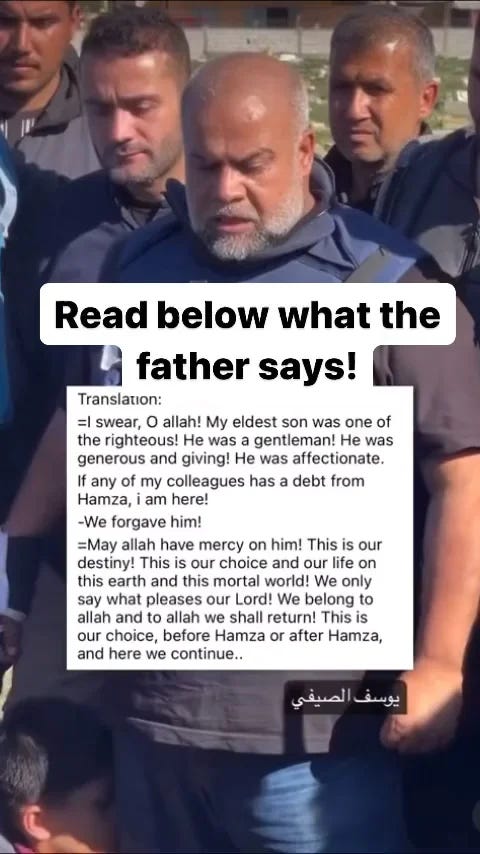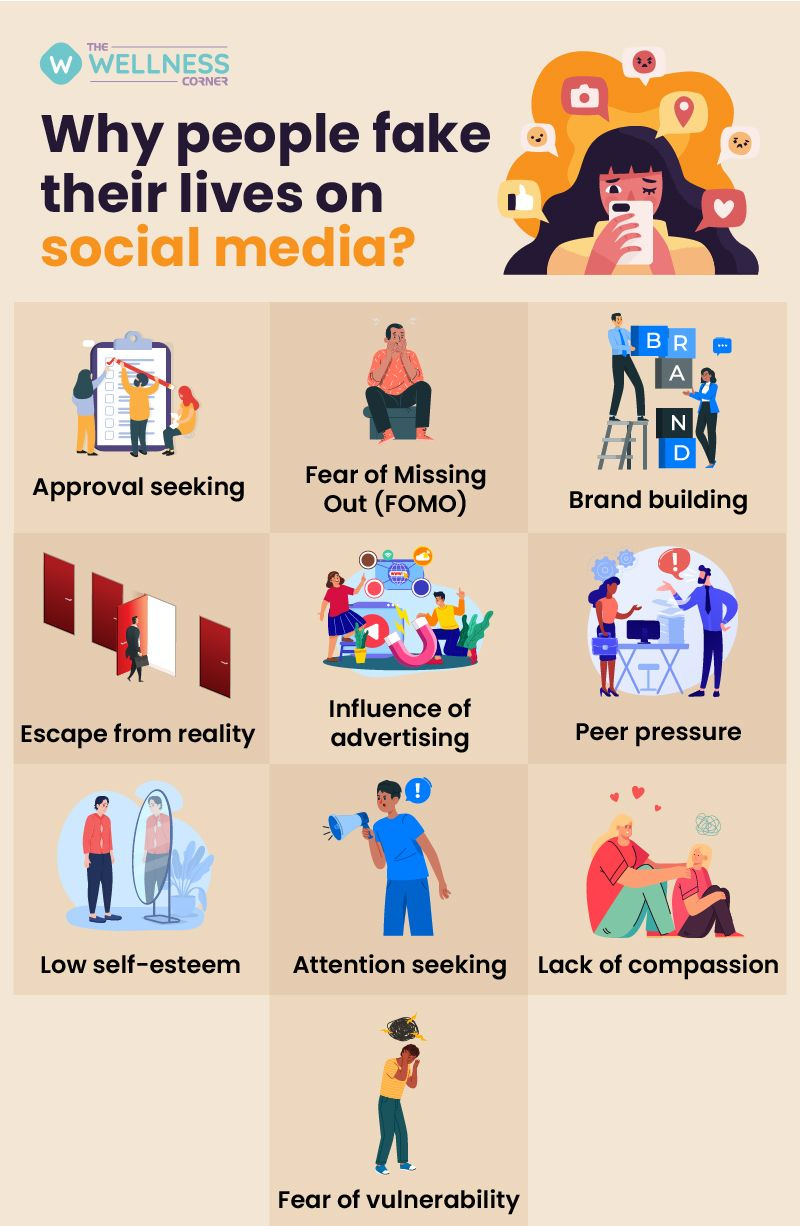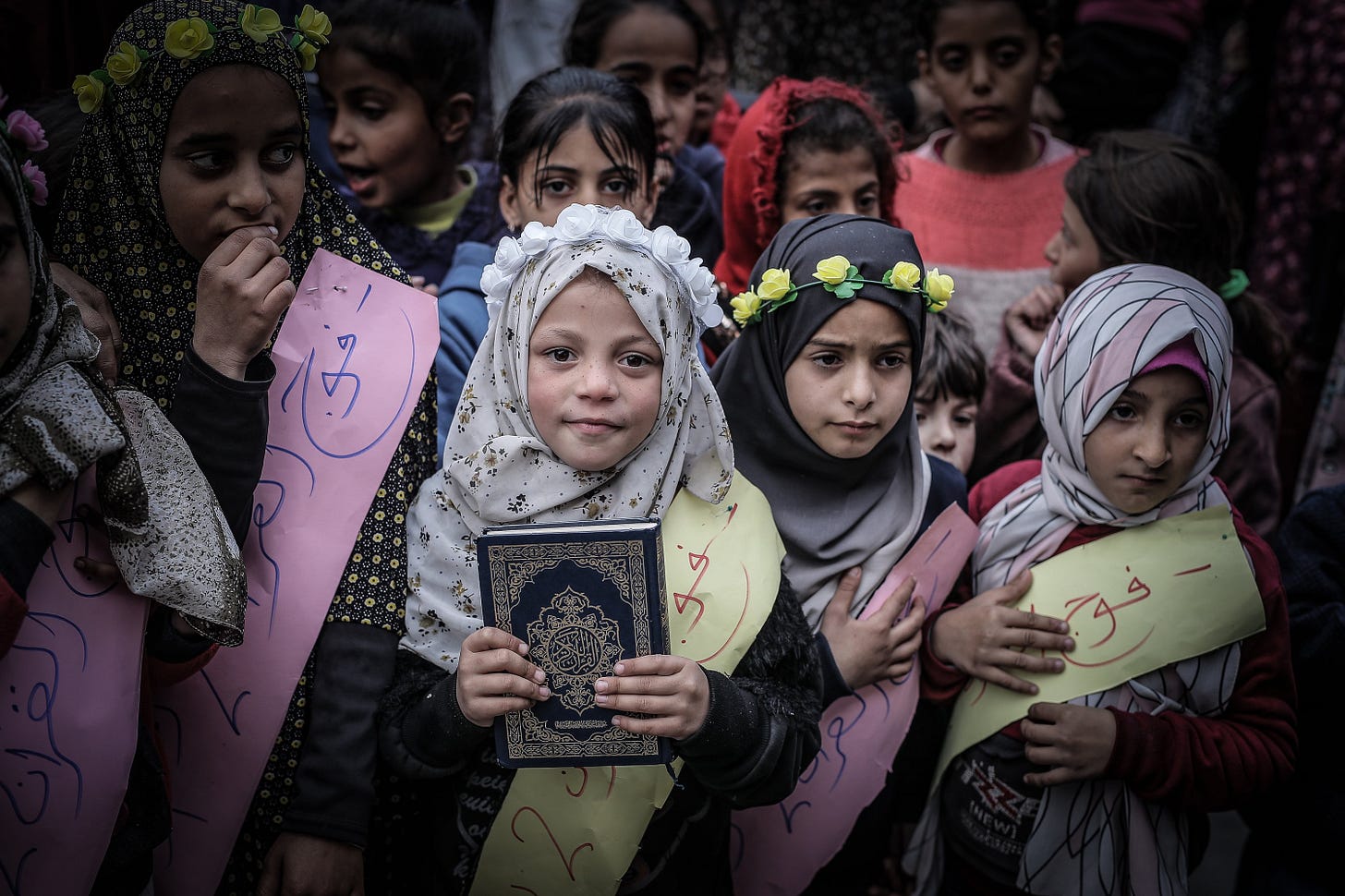Gaza and the Ghost of Us: The Murābiṭūn and the Age of Wahn
“A group from my Ummah will remain steadfast upon the truth, victorious, unharmed by those who abandon or oppose them, until the command of Allah comes.”
—The Prophet Muhammad ﷺ
There are moments when history doesn’t just unfold—it splits. Not in the grand theatrics of empires rising or collapsing, not in diplomatic summits or shifting borders, but in quieter, more eternal acts. In the stillness of a body shielding a child. In the final breath of a father whispering the shahādah beneath falling concrete. In the echo of “Allāhu Akbar” rising from blood-soaked earth like a defiant chorus of the unseen. These are not mere moments—they are ruptures in the veil of modern delusion. They are revelations.
Gaza is one such moment.
It is not only a place of suffering, but a mirror held up to our faces. A divine indictment of our indifference. A reminder that in an age addicted to images, there are still truths too heavy to filter. While much of the Ummah numbly scrolls, paralyzed by comforts and illusions, Gaza stands—wounded, encircled, and yet with unwavering faith.
Gaza has become the miḥrāb of our time—a sacred niche where sincerity is still alive, where prostration has weight, and where every soul cries out in longing for a justice not of this world, but of the next.
In Gaza, faith is not an identity.
It is not a cultural inheritance.
It is fire—and it is light.
It is the kind of faith most of us have forgotten how to carry. Or worse, have replaced with something polished, marketed, and hollow. Gaza stands in contrast not only to its enemies, but to us—its distant, comfortable brothers and sisters who have grown too at ease with a life stripped of struggle, sacrifice, and sincerity.
In the blood of their martyrs and the patience of their mothers, Gaza is speaking.
The only question is:
Are we still capable of hearing?
The Last of the Murābiṭūn
Moroccan philosopher Taha ʿAbd al-Raḥmān described the people of Gaza as the true Murābiṭūn—those who embody ribat, the station of spiritual and physical guarding on the frontiers of faith. For Taha, this is not just geographical but metaphysical. They are stationed on the final frontier between life lived for God and life hollowed out by the self.
In this metaphysical reading, the people of Gaza are not merely resisting tanks and drones; they are holding the line between a meaningful existence and a world collapsing into nihilism. Their steadfastness is not just political; it is ontological. In every act of resistance, they proclaim: “There is no god but Allah.” And in every martyr’s departure, they affirm: “To Him we return.”
Gaza does not merely resist occupation; it resists a metaphysical void that has swallowed much of the Ummah.
Worshippers of a False Life
Let us speak plainly: we are not Gazans. We are not the Murābiṭūn. We are, as the Prophet ﷺ warned, a dead body carried by the flood—overwhelmed not by force, but by forgetfulness. We are adrift in what he named wahn: love of dunya and hatred of death. We have lost not just our spiritual weight, but our sense of direction.
Our lives are not built for remembrance
They are built for distraction
The masjid is no longer at the center of our homes or hearts; the screen is. The adhān no longer orders our days; algorithms do. The Qur’an is no longer the map we follow; convenience is. And in the name of freedom and self-expression, we have surrendered to a new idol: the self—fluid, fragmented, curated, and never at peace.
We live within neoliberal postmodern subjectivity, where:
Truth is optional,
Identity is a commodity,
And the self is supreme.
We speak of justice but forget the Just. We perform activism without repentance. We collect information and call it knowledge, while our hearts remain untouched. Our lives are vast in noise, yet hollow in meaning.
Meanwhile, Gaza buries its martyrs and raises its hands in duʿā’. Where we scroll, they prostrate. Where we filter reality, they face it raw. Where we fear death, they run toward eternity.
They carry what we lost: truth, dignity, and God.
We inhabit carefully curated lives, animated by brands and screens, while Gaza buries its martyrs and raises its hands in duʿā’.
The Inverted Witness
What is faith when it no longer burns in the heart but exists only as a label—ticked on a form, worn like a costume? What is the Ummah when its body feels no pain, even as its limbs are severed?
We speak of unity, but Gaza bleeds alone. We speak of resistance, but we cannot resist our own distractions. We proclaim ummah, brotherhood, solidarity—yet step over our wounded with indifference. Gaza has not only revealed the brutality of its enemies; it has exposed the spiritual collapse of its supposed allies.
We have become spectators, not witnesses. Detached, paralyzed, safe. Our slogans are loud, but our prayers are absent. Our hearts are numbed by comfort, our activism often severed from sincerity. The Prophet ﷺ described the Ummah as one body—yet most of us have grown cold, while Gaza remains the only part still aching, still alive, still awake to God.
Between the Living and the Dead
In Gaza, a child recites Sūrat al-Fātiḥa before the missile strikes—not in fear, but in surrender. In our lives, we refresh feeds, sip lattes, and scroll past their suffering with glazed eyes. They live with the ākhirah etched into their every breath, while we flinch at the mere mention of death.
We, who possess abundance, live as if we own nothing beyond the present. They, who have almost nothing, live as if they already know the next world. Their faith is immediate, raw, and undistracted. Ours is often decorative, abstract, and conditioned.
This is not simply a geopolitical tragedy—it is a metaphysical inversion. Gaza is not a distant wound; it is the soul of the Ummah exposed. It bleeds where our pulse has gone silent. Spiritually, it may no longer be the periphery, but the very heart—beating, weeping, and remembering what it means to truly belong to God.
We who have so much, believe in so little.
They who have so little, believe with everything.
Reclaiming the Frontier
If we are to respond to Gaza with any sincerity, it cannot be with hashtags alone. It cannot be reduced to curated outrage or fleeting moments of digital solidarity. The response Gaza demands—and deserves—must begin at the deepest level: with repentance. A return to God. A turning away from the idols of modernity—comfort, ego, distraction—and a return to the ancient and enduring path of ʿubūdiyyah: servanthood.
We must shed the carefully constructed masks of postmodern selfhood—the influencers, the intellectuals, the activists who have lost their inner compass—and return to the heart of what it means to be Muslim: to surrender, to weep, to stand in prayer when the world sleeps. We must feel again. Break the spell. Grieve deeply, not just for Gaza, but for what we have become.
We Muslims must fast—not only from food, but from heedlessness. We must bow—not only in ritual, but in reverence. And we must begin to cry out:
“O Allah, do not replace us.
Let us not be from the hollow.
Make us among the Murābiṭūn.”
Because right now, Gaza holds the frontier—not just of land, but of meaning. Of integrity. Of faith under fire. And perhaps, through their thabāt, their unshakable steadfastness, Allah is giving us one final opportunity—not to save them, but to awaken ourselves.






Self introspection required at each level